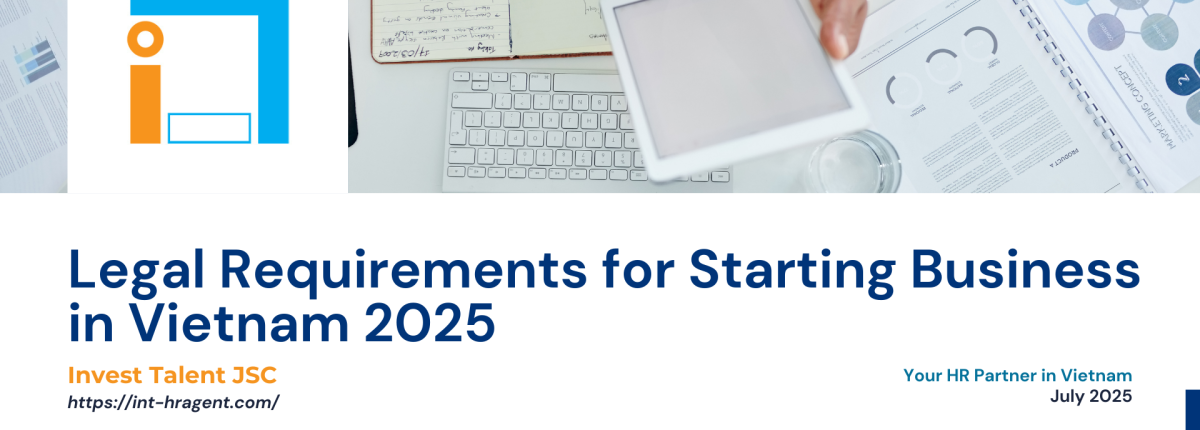Legal Requirements for Starting a Business in Vietnam 2025: A Brief Guide for FDI
Thinking of establishing a business in Vietnam in 2025? The country continues to be an attractive destination for foreign direct investment (FDI), thanks to its stable economy and pro-business policies. This brief guide outlines the key legal requirements for starting a business in Vietnam in 2025, keeping you informed for a smooth market entry.
Key Business Structures for Foreign Investors
Foreign investors commonly opt for:
- Limited Liability Company (LLC): Flexible, simple structure, ideal for small to medium-sized enterprises (SMEs). Can be 100% foreign-owned.
- Joint Stock Company (JSC): More complex, suitable for larger investments and potentially public listing.
- Representative Office (RO): For market research and liaison activities, but cannot conduct direct business operations.
Essential Legal Requirements & Procedures
While Vietnam's core business laws (like the Investment Law 2020 and Enterprise Law 2020) remain the foundation, some notable updates taking effect in 2025 aim to enhance transparency and streamline processes:
1- Investment Registration Certificate (IRC) & Enterprise Registration Certificate (ERC):
- IRC: Mandatory for foreign-invested enterprises (FIEs). This certificate confirms your right to invest in Vietnam. You'll need a detailed investment project proposal, proof of financial capacity, and a legitimate business address.
- ERC: After obtaining the IRC, this certificate officially registers your business as a legal entity and provides your tax identification number (TIN).
2- Registered Business Address:
- All companies must have a physical, registered office address in Vietnam. Residential addresses are generally not permitted for business registration, except for specific small-scale Vietnamese businesses. A commercial office lease agreement is a crucial document for registration.
3 - Charter Capital:
- For most sectors, there's no fixed minimum charter capital requirement. However, certain regulated industries (e.g., finance, real estate, education) have specific thresholds. It's crucial to declare a reasonable capital amount to cover operational needs. The full capital must generally be deposited within 90 days of receiving the ERC.
4 - Legal Representative:
- Every company must appoint at least one legal representative who resides in Vietnam. This individual is responsible for corporate governance, taxation, and legal compliance. Foreigners can serve this role but typically require a work permit or temporary residence card.
5 - Post-Licensing Procedures:
- Company Seal: Required for official transactions and legal documents.
- Corporate Bank Account: A dedicated corporate bank account must be opened. For foreign investors, a Direct Investment Capital Account (DICA) is also essential for capital flows.
- Tax Registration: Register for a Tax Identification Number (TIN) and understand your obligations for Corporate Income Tax (CIT), Value-Added Tax (VAT), Personal Income Tax (PIT), and Business License Tax.
- Labor & Social Insurance: If hiring employees, register for social insurance and comply with Vietnam's labor laws.
- Sector-Specific Licenses: Depending on your business activities (e.g., food, pharmaceuticals, e-commerce, import/export), additional sub-licenses may be required.
6 - Key Amendments to the Law on Enterprises 2025 (Effective July 1, 2025):
- Beneficial Ownership Disclosure: A significant new concept. Companies are now required to collect, update, store, and provide information on their "beneficial owners" (individuals who ultimately own or control the enterprise) in registration documents and to state agencies upon request. This aims to boost corporate transparency and align with international anti-money laundering standards.
- E-ID Vietnam Account for Enterprises: From July 1, 2025, companies are required to register an e-ID Vietnam account for online administrative procedures. While the process for foreigners is still being fully established, this is a move towards digitalizing government services.
- Enhanced Personal Responsibility of Legal Representatives: The amended law clarifies that legal representatives are personally liable for damages to the company due to violations of their obligations.
Expert Tip for Success
Navigating Vietnam's legal framework can be complex, especially with ongoing updates. Engaging experienced local legal and consulting firms is highly recommended. Invest Talent JSC can provide expert guidance on pre-application planning, document preparation, submission, and post-licensing compliance, ensuring a smooth and compliant market entry for your business.
For a successful start in Vietnam, understanding these legal requirements and staying updated on regulatory changes is paramount. Invest Talent is your all-in-one assistant in Vietnam market, from business set-up to payroll and recruitment services.












_Company_in_Vietnam-cr-800x500.png)
